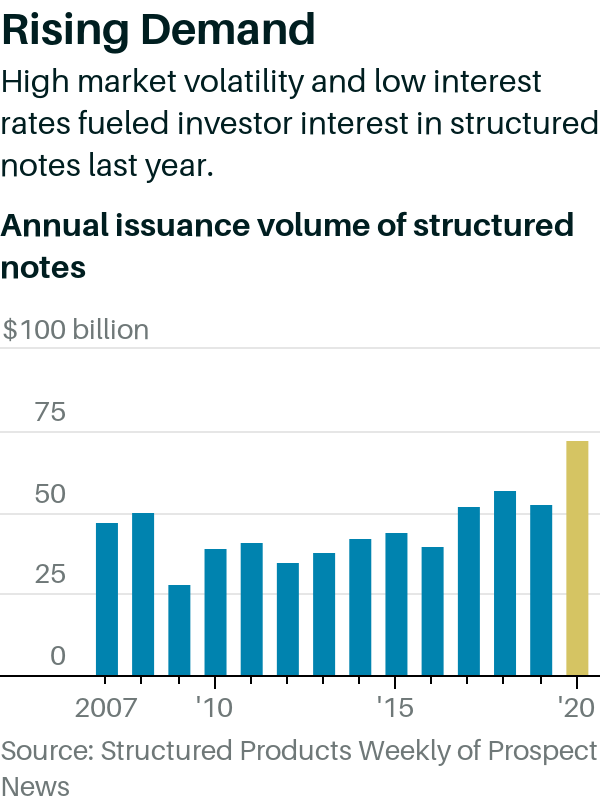What are the benefits of taking structured notes?
Contents
- 1 What are the benefits of taking structured notes?
- 2 What are structured products and how do they work?
- 3 What is OCBC structured deposit?
- 4 Are structured products safe?
- 5 Is a structured product a good investment?
The flexibility of structured records allows them to provide a variety of potential results that are difficult to find elsewhere. Structured notes can offer increased or decreased potential upside, downside risk, and overall volatility.
Why aren’t structured notes right for you? Investment banks claim that structured records offer asset diversification, the ability to benefit from stock market performance, and downside protection. … Call risk, lack of liquidity, and inaccurate pricing are other disadvantages of structured notes.
What is structured note taking?
Structured Note-taking is a strategy that helps students become more effective note-takers. Using graphic organizers specific to specific texts, structured notes assist students in understanding the content of their reading.
What is the process of note taking?
Choose a note-taking format, organize notes pages, jot down Essential Questions, and take notes based on information sources (lectures, books, websites, articles, videos, etc.), selecting, paraphrasing, and organizing information in a way that meets your note-taking goals. Processing Notes Think about notes.
What is strategic note taking?
Strategic note-taking (Boyle, 2013) leads students to better understand lecture content through activating prior knowledge of the topic, monitoring teacher cues that mark key points for inclusion in notes, recording new vocabulary items, and reflecting on interconnections between lecture points.
Are structured notes liquid?
There is no liquid market for structured bonds. If you want to sell your structured notes before maturity, you may have to do so for less than the amount you paid for them, or you may not be able to sell them at all.
What is the benefit of structured products?
Other benefits depend on the type of structured product, as each product is different. These advantages may include, ultimate protection, low volatility, tax efficiency, returns greater than that given the underlying asset (leverage), or positive returns in a low-yield environment.
Why do clients buy structured products?
They offer a wider range of investment opportunities than any other type of investment. And, they can be used for practical purposes such as adding diversification to an investment portfolio, protecting currency risk and even helping to manage cash flow.
What are the two main benefits of a structured deposit?
Potential for higher yields compared to deposits. Exposure to assets and/or markets that retail investors would normally not have access to. Diversification of investment into other financial products. Investors will receive 100% of the Principal Amount invested if the Structured Deposit is held to maturity.
Is a structured product a good investment?
Structured Products are a good investment if you don’t want to risk all your capital. Since most of your money is set aside for protection, Structured Products offer a moderate risk investment method. You will only lose on this investment if the counterparty or deposit taker becomes solvent.
What are the pros and cons of structured notes?
Benefits of structured notes include the potential for higher returns than CDs, participation in a reverse market while also limiting downside exposure, and customized parameters of the banknote to suit your level of risk. Some structured records may have a “buffer,” which describes the downside protection.
Do structured notes pay interest?
Banks issue structured debt securities without interest rates. In contrast, the returns on notes are based on the performance of the S&P 500. By linking returns to the S&P 500, the bank has created a derivative. It has not directly invested in related stocks.
Are structured notes fixed income?
What are Fixed Income Structured Notes? Fixed Income Notes are a type of fixed income investment for investors looking to increase yields, express a particular view on interest rates or protect an existing investment portfolio.
What are structured products and how do they work?

Structured products are investments that provide returns based on asset performance. These assets can include equities, indices, funds, interest rates, currencies, commodities or property markets. The yield and level of capital at risk can be predetermined.
What are the different types of structured products? Ian Lowes, founder of StructuredProductReview.com, points out that the three main types of structured products are: structured deposits, structured capital ‘protected’ products and structured risk capital products.
What is the meaning of structured product?
Structured products, also known as market-linked investments, are pre-packaged structured financial investment strategies based on a single security, a basket of securities, options, indices, commodities, debt or foreign currency issuances, and to a lesser extent. , derivative.
What is an example of a structured product?
A simple example of a structured product is a $1000 CD that expires in three years. It does not offer traditional interest payments, but instead, annual interest payments based on the performance of the Nasdaq 100 stock index. If the index goes up investors get a share of the profits.
What is a structured product fund?
A structured mutual fund is a type of fund that combines equity and fixed income products to provide investors with a level of capital protection and capital appreciation. … Structured mutual funds also use options, futures, and other derivatives, often linked to market indices, to provide exposure to capital appreciation.
How do you identify a structured product?
Features of Structured Products Mix of conventional instruments: Structured products are always a combination of several financial instruments that are integrated to achieve pre-determined goals. Ticket Size: Structured product requires a minimum investment of Rs 10 lakh by the investor if invested directly.
How does a structured product work?
A structured product is a pre-packaged investment that typically includes interest-related assets plus one or more derivatives. These products can take traditional securities such as investment grade bonds and replace regular payment features with non-traditional payments.
How are structured products made?
Structured products are created by investment banks and often combine two or more assets, and sometimes multiple asset classes, to create a product that pays based on the performance of the underlying asset. Structured products vary in complexity from simple to very complex.
What are examples of structured products?
A structured product is a financial instrument whose performance or value is tied to an underlying asset, product, or index. This may include a market index, an individual or a basket of stocks, bonds, and commodities, currencies, interest rates or a mix of these.
What is an example of a structured product?
A simple example of a structured product is a $1000 CD that expires in three years. It does not offer traditional interest payments, but instead, annual interest payments based on the performance of the Nasdaq 100 stock index. If the index goes up investors get a share of the profits.
Is a CD a structured product?
CDs and structured records typically pair fixed-income investments (such as CDs or bonds) with a performance component (usually an option). … Structured products are complex products that involve investment risk and other substantial risks compared to traditional investments and may not be suitable for all investors.
What do you mean by structured products?
What is a Structured Product? A structured product is a pre-packaged investment that typically includes interest-related assets plus one or more derivatives. They are generally tied to an index or a basket of securities, and are designed to facilitate highly adjusted risk-return objectives.
How do you identify a structured product?
Features of Structured Products Mix of conventional instruments: Structured products are always a combination of several financial instruments that are integrated to achieve pre-determined goals. Ticket Size: Structured product requires a minimum investment of Rs 10 lakh by the investor if invested directly.
What is OCBC structured deposit?

Structured deposits are financial instruments that combine deposits with investment products. Structured deposits placed by customers will be invested in notes, bonds or other fixed income securities issued by companies that meet the Bank’s Environmental, Social and Governance (ESG) criteria.
What is a structured deposit? Structured deposits are deposits that are absorbed by commercial banks embedded with financial derivatives, which are related to fluctuations in interest rates, exchange rates, indices, etc. or with the credit of an entity, so that the customer can obtain the relevant return based on a particular take. risk.
Is structured deposit principal guaranteed?
The amount placed in the 2021 UOB Principal Guaranteed Structured Deposit – Series (1) is guaranteed principally only if held until the maturity date. Investing in structured deposits carries certain risks, including the potential loss of the principal amount invested if the investment is not held to maturity.
Are structured products high risk?
A Structured Product is a hybrid investment consisting of bonds and options. They offer the potential for a higher return on investment compared to standard deposits. Structured products are low-risk investments and may receive up to 100% capital protection.
Are structured products FDIC insured?
No, structured records with primary protection are not insured by the FDIC.
Are structured deposits safe?
What are the risks of structured deposits? One of the biggest risks of structured deposits is the risk of not receiving interest if the stock market index does not perform in a certain way; for example if it has not increased during the time period or if it has decreased by more than the specified amount during the time period.
Are structured deposits covered by FSCS?
Structured Deposit Plans. The Structured Deposit Plan is a capital protected product and has up to £85,000 covered by the Financial Services Compensation Scheme (FSCS).
Are structured products FDIC insured?
No, structured records with primary protection are not insured by the FDIC.
Is structured deposit same as fixed deposit?
Structured deposits are different from fixed deposits. But as with traditional deposits, any return of principal and any returns is subject to the credit risk of the bank holding the deposit.
Are structured deposits government guaranteed?
Structured deposits are protected by the Deposit Guarantee Fund, just like traditional deposits.
Is structured deposit same as fixed deposit?
Structured deposits are different from fixed deposits. But as with traditional deposits, any return of principal and any returns is subject to the credit risk of the bank holding the deposit.
Is structured deposit Fixed Deposit?
Structured deposits have several important characteristics that distinguish them from traditional deposits. In the case of fixed deposits, the return and maturity period are fixed. Structured deposits on the other hand have variable returns, and in some cases, variable maturities as well.
Which deposit are also called as Fixed Deposit?
Fixed deposits, also known as FDs, are investment instruments offered by banks, as well as non-banking finance companies (NBFCs) to their customers to help them save money. With an FD account, you can invest a certain amount of money at a predetermined interest rate for a certain period of time.
Are structured products safe?

There are three main risks attached to structured products, according to Nick Johal, director of Dura Capital. These are credit risk, market risk and inflation risk. In terms of credit risk, Mr Johal describes this as “the collateral that supports your investment plan will be issued by a financial institution, usually a bank.
Are structured notes safe? Structured records are often too risky and complex for individual investors. … This risk arises when the underlying derivative becomes unstable. That can happen with equity prices, interest rates, commodity prices, and foreign exchange rates. Low liquidity is often a problem for holders of structured debt.
Are structured products high risk?
A Structured Product is a hybrid investment consisting of bonds and options. They offer the potential for a higher return on investment compared to standard deposits. Structured products are low-risk investments and may receive up to 100% capital protection.
Are structured products covered by FSCS?
The Structured Deposit Plan is a capital protected product and has up to £85,000 covered by the Financial Services Compensation Scheme (FSCS).
What is a risk involved with investing in structured products?
Among the risks associated with investing in structured products are liquidity risk, market risk and counterparty risk. … Investment involves risk. You may lose (part of) your deposit.
Do structured products have credit risk?
Comparison with direct investments You should consider the following differences between direct investments before considering investing in structured products: – Structured products bear the credit risk of the investment issuer.
Do structured products have credit risk?
Comparison with direct investments You should consider the following differences between direct investments before considering investing in structured products: – Structured products bear the credit risk of the investment issuer.
What is the risk of structured products?
There are three main risks attached to structured products, according to Nick Johal, director of Dura Capital. These are credit risk, market risk and inflation risk. In terms of credit risk, Mr Johal describes this as “the guarantee that supports your investment plan will be issued by a financial institution, usually a bank.
What is a risk involved with investing in structured products?
Among the risks associated with investing in structured products are liquidity risk, market risk and counterparty risk. … Investment involves risk. You may lose (part of) your deposit.
Do structured products have a credit rating?
The credit rating, if any, relates to the issuer and is not an indication of the market risk of the structured product or underlying asset. If a structured product provides principal protection or minimum returns, that guarantee depends on the credit quality of the issuer.
Is a structured product a good investment?

Structured Products are a good investment if you don’t want to risk all your capital. Since most of your money is set aside for protection, Structured Products offer a moderate risk investment method. You will only lose on this investment if the counterparty or deposit taker becomes solvent.
Why do people invest in structured products? Structured products offer the potential for increased yields, if your view of the market proves to be correct and the product publisher deserves credit. Structured deposits that offer principal repayments as they fall due can be a useful alternative to a savings, checking or time deposit account.
What are the advantage of structured products?
Other benefits depend on the type of structured product, as each product is different. These advantages may include, ultimate protection, low volatility, tax efficiency, returns greater than that given the underlying asset (leverage), or positive returns in a low-yield environment.
What are the disadvantages of investing in a structured product?
Disadvantages of structured products can include: Credit risk – structured products are unsecured debt from investment banks. Lack of liquidity – structured products are primarily freely traded and the issuer is under no obligation to make offers.
Are structured products good?
To the casual investor, structured records seem reasonable. Investment banks advertise structured records as an ideal tool to help you benefit from excellent stock market performance while protecting you from poor market performance.
What are the disadvantages of investing in a structured product?
Disadvantages of structured products can include: Credit risk – structured products are unsecured debt from investment banks. Lack of liquidity – structured products are primarily freely traded and the issuer is under no obligation to make offers.
What are the risks of structured products?
There are three main risks attached to structured products, according to Nick Johal, director of Dura Capital. These are credit risk, market risk and inflation risk. In terms of credit risk, Mr Johal describes this as “the guarantee that supports your investment plan will be issued by a financial institution, usually a bank.
What are the pros and cons of structured notes?
Benefits of structured notes include the potential for higher returns than CDs, participation in a reverse market while also limiting downside exposure, and customized parameters of the banknote to suit your level of risk. Some structured records may have a “buffer,” which describes the downside protection.
Are structured products high risk?
A Structured Product is a hybrid investment consisting of bonds and options. They offer the potential for a higher return on investment compared to standard deposits. Structured products are low-risk investments and may receive up to 100% capital protection.
What is a risk involved with investing in structured products?
Among the risks associated with investing in structured products are liquidity risk, market risk and counterparty risk. … Investment involves risk. You may lose (part of) your deposit.
Are structured products covered by FSCS?
The Structured Deposit Plan is a capital protected product and has up to £85,000 covered by the Financial Services Compensation Scheme (FSCS).
Do structured products have credit risk?
Comparison with direct investments You should consider the following differences between direct investments before considering investing in structured products: – Structured products bear the credit risk of the investment issuer.
